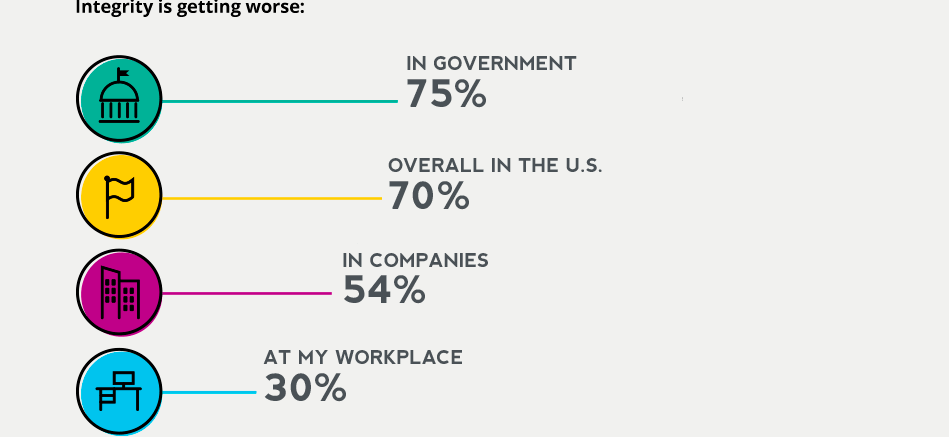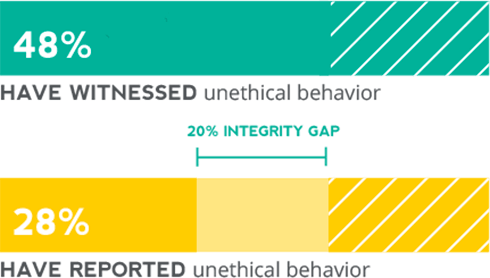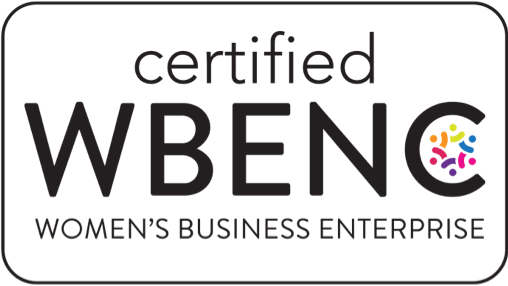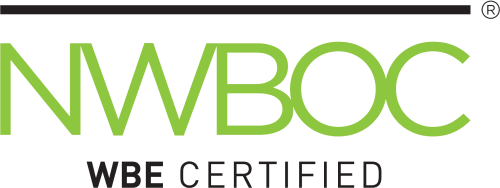Report
The corporate integrity implosion: Managing in the era of exposure

New research by Eagle Hill Consulting reveals that the majority of working Americans believe that integrity is on the decline in corporate America. Fifty-four percent of respondents say that integrity has gotten worse in corporations during the past five years. According to those surveyed, the decline starts at the top. Only 15 percent say that corporate executives have the most integrity in the workplace (compared to immediate bosses and colleagues), while nearly half say that their colleagues have the most integrity in the workplace. (See Figure 1.)
The Era of Exposure
Corporate scandals have become increasingly common in the headlines. Recent examples include Uber, Wells Fargo, Equifax, and NBC. This is fueled by the 24/7 news cycle and the ability of any individual with a mobile device to record questionable corporate behavior and blast out to social media in real time. The financial and reputational damage—as well as the immediate job security of a company’s top executives—can hit harder and faster than ever.
At a time when Americans say integrity is on the decline, and exposure to risk is increasing, executives must recalibrate their company’s values and how they are applied to today’s environment.
Figure 1: Who has the most integrity in the workplace

Source: The 2018 Eagle Hill Consulting Corporate Culture Survey
U.S. Workforce Reports a Widespread Decline of Integrity
The sheer volume of bad behavior in recent years is having a deep impact on Americans’ perception of corporate integrity. More than half (54 percent) of respondents say that integrity is getting worse in corporate America. This corporate slump is part of a larger phenomenon. According to the survey results, seventy percent of Americans say that integrity is falling across the nation. Three-fourths also say that integrity is on the decline among government institutions. (See Figure 2.)
Figure 2: Americans report a widespread decline of integrity

Source: The 2018 Eagle Hill Consulting Corporate Culture Survey
Integrity is the cornerstone of how employees make decisions, act and react in ordinary and extraordinary circumstances. Without a foundation of integrity, all other assets are at risk. As Warren Buffet said, “In looking for people to hire, you look for three qualities: integrity, intelligence, and energy. And if you don’t have the first, the other two will kill you.”
Eagle Hill’s analysis of the core values of the Fortune 500 finds that more than half of the companies that list core values have “integrity” or “morals” as a core value. Surprisingly, 113 Fortune 500 companies do not list “integrity” or “morals” in their core values.
This raises several questions:
- Are companies too quick to assume that integrity is a given?
- What does it say about companies that have “integrity” as a core value, but have leaders and employees deviating from this core value?
113 Fortune 500 companies do not list “integrity” or “morals” in their core values.
The norms in the new economy have changed so much that it is time for companies to recalibrate what it means to have integrity in the workplace.
Most People Witness Unethical Behavior at Work, but Few Report It
A significant amount of U.S. workers report witnessing unethical behavior at work. Nearly half (48 percent) of the American workforce has seen someone do something unethical at work. Yet, only 28 percent have reported unethical behaviors at their workplace. (See Figure 3.)
Figure 3 : The integrity gap at work

Source: The 2018 Eagle Hill Consulting Corporate Culture Survey
Workers say that some of the reasons they would not report an unethical behavior in the workplace include not knowing what to do or being scared of how doing so might impact them. (See Figure 4.)
Figure 4: why workers don’t report un-ethical behaviors

Source: The 2018 Eagle Hill Consulting Corporate Culture Survey
Start Here: Corporate Culture
While gaps in integrity can make instantaneous headlines, companies where integrity is woven into the corporate culture every single day are able to stay laser focused on their competitive advantages.
A future-looking executive is investing in this invisible—yet tangible—asset every day.
Here’s how:

Marry strategy and cultural values.
Instead of living in the background, make integrity—and your company’s priority cultural values—a strategic priority. Start by clearly defining what values are for your organization. Winning companies are intentional about cultural values—such as integrity—and tackle both strategy and culture simultaneously. If you aren’t intentional about building the desired culture for your organization, it will morph on its own and may not become what you want it to be.

Make it the lifeblood.
Living your company’s values should not be reserved for special occasions or annual retreats. It should be the lifeblood of the company and integrated into policies and practices. Leaders can drive this by building values—including integrity—into everyday responsibilities, from hiring practices and incentives to strategy development and performance measurement. Never assume values are a given.

Make it visible.
Determine what integrity looks like in practice for your organization. Culture is driven from the top down. Focus on empowering leaders and making them your cultural ambassadors. When employees see leaders living your company’s culture and values, everyone else will follow suit.

Evaluate, act, repeat.
Sustaining a desired organizational culture takes work. Be sure to maintain a consistent pulse on your organization’s culture and address shortcomings. Don’t assume addressing a cultural challenge once will fix the issue for the long term.
Methodology
The survey included 1,506 interviews across the U.S. adult working population. The survey polled respondents on issues of culture, specifically integrity, respect, trust and unethical behavior in the workplace. The results were weighted to reflect U.S. demographic factors, including the four national census regions, age, income, and gender. The 2018 Eagle Hill Consulting Corporate Culture Survey was conducted by Ipsos in April 2018.


